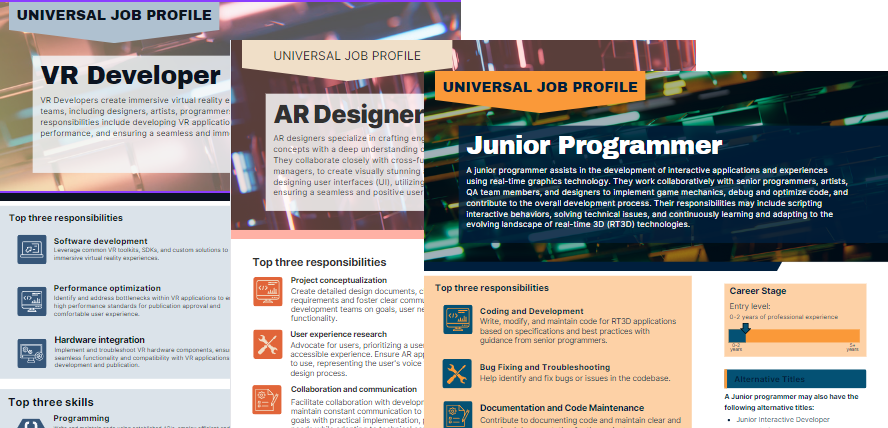
Universal Job Profiles
Tutorial
foundational
+0XP
5 mins
(76)
Unity Technologies

In this overview, you’ll learn about the Universal Job Profiles, what problem they solve, and how they serve job seekers, educators, and employers.
Join our Beta Program and get advanced copies of the Universal Job Profiles. See details below.
Resources
Languages available:
1. What problem are we trying to solve?
If you’ve ever spent any time looking at job listings for games or other real-time industries, you’ve probably noticed how responsibilities and requirements vary significantly from company to company. This lack of consistency in requirements makes it challenging for first time job seekers in the industry to prepare for a desired role, as they don’t know which skills they actually need to build. This confusion around industry expectations extends to educational and training institutions, which struggle to build curricula that satisfy the needs of employers. As a result, employers are overwhelmed with a huge number of applicants for every job they post, and they struggle to separate qualified candidates from unqualified ones. The current process of preparing for, applying to, and hiring for jobs is slow, complicated, and needlessly painful.
Although each organization has its own unique approach to production, there are certain base-level skills that all professionals in specific roles should have. For example, all environment artists need to be able to produce models with clean and optimized geometry, and programmers must be able to diagnose and debug their own code. These are things that professionals already in the industry take for granted, but those base-level requirements are vital skills that must be communicated to job seekers and educators if we want to see highly qualified candidates entering the job market.
It’s our belief that if we work together to establish these baseline standards, job seekers can judge when they’re truly job ready, educators can build learning experiences that cover the full scope of a role’s responsibilities, and employers can spend their onboarding time getting new hires acclimated to company standards rather than training them on the basics.
To support standardization within games and other real-time industries, Elevate’s mission is to develop Universal Job Profiles.
2. What is a Universal Job Profile?

Universal Job Profiles (UJPs) are industry vetted detailed overviews of specified job roles within real-time industries.
They include:
- A job overview
- Responsibilities
- How the role fits within a studio structure
- Core skill requirements
- Commonly used tools
- Application requirements
- Common interview processes
- Resources for skill development
- And more!
A UJP will serve as a handbook for anyone who wants to get a job, create a learning experience to prepare people for a job, or vet someone for a job. Because the RT3D job landscape is always changing, UJPs are living documents, reviewed twice a year and updated as needed.
To support the creation of UJPs we’ve launched an Employer Advisory Board (EAB): a group of experts from industry-leading companies from all parts of the real-time landscape, including games, media, training, and more. The EAB serves as our subject matter expert resource, and provides us with important industry insights about in-demand job roles. By working with the Employer Advisory Board, we know the information we’re sharing in the UJP is up-to-date, accurate, and represents actual industry needs. You can read more about the EAB here.
To promote access and equity in the industry, all Universal Job Profiles will be public and completely free to use.
We don’t want to limit the path to success in real-time to only Unity developers; UJPs will be globally accessible for everyone trying to break into real-time roles, regardless of their preferred tools. As such, UJP will provide tool-agnostic guidance for roles across all real-time industries, and our Employer Advisory Board will reflect this as well. This is an initiative for everyone.
3. Universal Job Profile use cases for job seekers
While the UJPs are multi-purpose and beneficial for many groups, their primary goal is to help job seekers fully prepare to become highly qualified candidates for their desired real-time industry role. For job seekers, UJPs are designed to be used as a workbook, where users actively research and follow the recommended areas of study chapter by chapter, with the goal of being job ready by the time the document has been completed.
UJPs are divided into contextual and actionable information sections. The first sections are contextual information, and help you gain a deep understanding of a specific industry role. You’ll learn what someone in the role does day-to-day, the skills they need, common tools that they use, and their closest collaborators. The second half of the document is all actionable, and breaks down the skills you need and resources for how to build them. These sections are formatted as a series of checklists, so you can keep track of what skills you already have and what you still need to learn.
4. Universal Job Profile use cases for educators
A common criticism of educational institutions by real-time employers is that the skills they teach students tend to be two to five years out of date. While it’s true that educational institutions must adhere to their own internal schedules for updating their curricula, a major pain point is lack of up-to-date information on industry needs. Since UJPs will be regularly maintained, educators can use them as a dependable source of truth when updating and creating new curricula.
We encourage educators to build curricula that align to job profiles, including the creation of paid online courseware. By aligning your courses with UJPs, students and job seekers will know that the skills they’ll learn will directly help them prepare for their desired job role. Those who take courses aligned with UJPs will also be automatically prepared to take Unity certifications, as well as any other certifications that may align with UJPs in the future.
UJPs have a dedicated section for learning resources that we plan to populate with all available aligned learning content. If you create a course that aligns with a Universal Job Profile, you can submit it for inclusion in the learning resource list for free. We’ll review your content and if it aligns with the profile, we’ll include a link to your content in the next update. Educational institutions with courses that align with job profiles may apply as well, and we’ll link to your program’s landing page.
Submit your course or other learning experience for review here.
5. Universal Job Profile use cases for employers
While the primary goal of the UJPs is the creation of highly qualified candidates, employers can directly make use of the profiles as well. With in-depth overviews of day-to-day requirements and complete skill lists, employers can use UJPs as the basis of job listings and evaluate potential candidates against them.
UJPs are particularly useful for studios that have made the decision to open a real-time division within their company, as they provide guidance on what roles will be particularly useful for achieving specific goals, as well as give context on what related roles might be necessary within their new studio structure.
Employers can also become involved in shaping UJPs by joining the Employer Advisory Board.
6. Download the Universal Job Profiles
The Universal Job Profiles are now available in early access! You can download the documents at the top of the page, or by selecting the profiles below:
VR Developer
AR Designer
Junior Programmer
If you would like to leave us feedback about the job profiles, please do so by filling out this form.